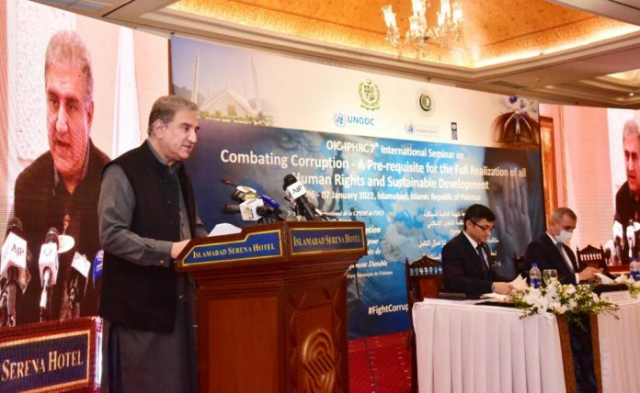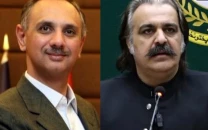FM Qureshi urges action against illicit financial flows from developing world
Calls on requested states to return recovery assets 'without conditionality' to countries of origin

Foreign Minister Shah Mahmood Qureshi called on Thursday for immediate and robust national and international action to curb illicit financial flows from the developing world to financial safe-havens.
The minister made the remarks during his address to the 7th international seminar jointly organized by the Organisation of Islamic Cooperation (OIC) and Independent Permanent Human Rights Commission on 'Combating Corruption - A Pre-Requisite for the full realization of All Human Rights and Sustainable Development'.
FM Qureshi maintained that in line with Prime Minister Imran Khan’s vision, fighting corruption and ensuring the protection of all human rights were the top priorities of the incumbent government.
“Corruption is an enormous obstacle to the realisation of all human rights - civil, political, economic and cultural - as well as the right to development.” he said, adding that corruption struck at the very root of good governance and democracy.
He further stated that corruption eroded public trust in the legitimacy of state institutions, undermined the rule of law and violated the values of transparency, accountability, justice and fair play.
“It also undermines the successful implementation of all 17 sustainable development goals by hampering economic growth, increasing inequality and inhibiting prosperity,” the foreing minister added.
According to Qureshi, corruption stifled opportunities for the poor and marginalised and condemned them to a life of misery and inequality.
“Corruption leads to massive illicit financial flows out of developing countries,” he reiterated.
The FM further said that in addition to deadweight economic losses, corruption created inefficiencies and skewed the allocation of public resources from those who were most in need.
He stated that the United Nations high-level panel on financial accountability, transparency and integrity has calculated a staggering $7 trillion in stolen assets, which are parked in financial safe havens.
Read PM concerned over sharp rise in ‘sex crimes’, corruption
“This organised theft and illegal transfer of assets has profound consequences for developing nations,” he said, adding that the “stolen money” could be spent to meet development needs.
“The Covid-19 pandemic has further widened existing inequalities, pushed millions of people into extreme poverty and resulted in the loss of millions of jobs,” he said.
FM Qureshi maintained that allowing corruption and illicit financial flows to continue under current circumstances was nothing short of “criminal”.
He highlighted that 15 years had passed since the adoption of the UN Convention Against Corruption (UNCAC) which was the only legally binding instrument of anti-corruption.
“Unfortunately, despite explicit provisions, there are increased barriers in the asset recovery process as well as their return to countries of origin,” Qureshi said.
“Curbing illicit financial flows, and recovering and returning stolen assets can contribute to effective resource mobilisation for achieving Sustainable Development Goals”.
He emphasised that requested states should return the recovery assets “without conditionality” to states of origin, and the possibility of an additional protocol on asset recovery under UNCAC should be explored.
He further stated that corruption should simultaneously be pursued as a human rights issue and that pursuing a human-based approach to corruption can help complement the efforts to combat corruption and promote more effective implementation of international anti-corruption instruments.
“So long as corruption remains undefeated, efforts to promote the realisation of human rights can achieve little,” Qureshi maintained.
The foreign minister also said that fighting corruption in the Islamic context is rooted in the Holy Quran and the teachings of the Prophet Muhammad (PBUH), both address “major types of corruption” such as bribery, extortion, nepotism and favouritism.


















COMMENTS
Comments are moderated and generally will be posted if they are on-topic and not abusive.
For more information, please see our Comments FAQ